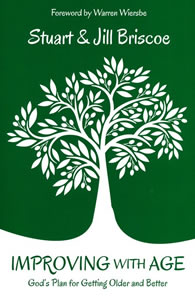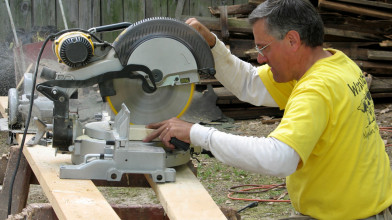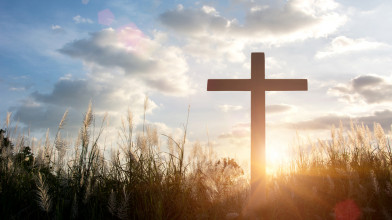John Fuller: Jill Briscoe, our guest last time, reflects on maturing in Christ.
Teaser:
Mrs. Jill Briscoe: I know it, but the growing younger and younger and younger-till-glory bit is so possible that you don’t internally, spiritually feel old.
End of Teaser
John: Welcome to another edition of “Focus on the Family.” I’m John Fuller and your host is Focus president and author, Jim Daly.
Jim Daly: John, I’m thinking of the folks listening who maybe are over 60, over 70, maybe have supported Focus on the Family for quite a while. We certainly appreciate you and what you have done. Your kids are raised. I’m sure Dr. Dobson’s Dare to Discipline was one of the books that you used. In fact, we had a[n] Institute student here a while back. That’s the college program that we ran and this kid wrote a poem. He was probably 22-years-old and he wrote this little poem. “Roses are red; violets are blue; I got spanked because of you.” (Laughter) And so, I mean, that was a heartfelt way of expressing it.
Today we want to talk to two experts (Laughing) who are in their 80’s–that’s what makes them the experts–about aging and they’ve written a book, Improving with Age. It’s Stuart and Jill and this is a fabulous resource. If you want to end well and please the Lord, and I know that’s your heart, that’s all of our hearts, let’s get off the grumpy trail and get on to a direction, a compass direction that really honors the Lord right to the end. That’s what we’re gonna talk about today, and I’m excited to get back to it. Welcome to both of you. Welcome back to “Focus.”
Jill: Thank you.
Mr. Stuart Briscoe: Thank you very much.
Jim: I so loved the beginning of the discussion last time. We talked about your childhood situation, being in England during World War II. In fact, Jill, you mentioned hearing Churchill’s speech—
Jill: Yes.
Jim: –one of his many wonderful speeches about courage. What caught your attention as a 6-year-old girl when you heard Winston Churchill encourage the nation?
Jill: Fear. I couldn’t help by hear the words over and over again: “They’re coming. We’ve nothing to stop them.” That’s what a 6-year-old hears from that and knows that the church bells had to be quiet, because that would be the signal for everyone in the world, in our world to know the invasion had begun. That was our way of communicating with the entire nation.
Jim: What an amazing way to start your life.
Jill: And so, what else but fear and I think how that worked in my life, perhaps because of my personality. I’m very timid, and I’m frightened of everything. I always have been. I don’t have courage, until I realized what is courage? Courage is being obedient, when you don’t feel like it. Courage is doing the right things, frightened out of your mind. Courage is going into a place that is a very difficult and dangerous place, because that’s where you should go.
Jim: Hm.
Jill: And I found that the power that I need isn’t a feeling. it’s a decision. Courage is a decision. I’ll go in if I must, frightened out of my mind because it’s the right thing to do.
Jim: Right, that is so beautifully said. I was at one of my boys’ Bible studies. It was Troy and he was probably 8 or 9 at the time. And I have a coffee cup that’s John Wayne. We’re gonna put it in the American vernacular. And at this Bible study, the Bible study leader said, “Can any of you define the word ‘courage?'” And Troy threw his hand up, and he said, “Yes, Troy.” And he said, “Courage is being scared to death, but saddling up anyway.”
Jill: Absolutely, I love that.
Jim: And (Laughing) the man said, “Where did you hear that?” He goes, “My dad’s John Wayne coffee cup.” (Laughter) But that’s really it; being scared to death, but saddling up anyway.
Jill: That’s exactly what it means.
Jim: That is the Christian way.
Jill: Knowing you have to say that, whatever the result of you saying something in a hostile situation, it needs to be said. And if you wait for “Oh, I love this” feeling inside you, for the “whomph: or what is courage? We think it’s a feeling. It is not.
Jim: What does courage look like in your 80’s? And you’ve served the Lord so well over the years. You’ve been pastoring for many, many years. You’ve done marriage classes and still do them, premarital counseling and all kinds of things. You’ve lived in the United States for 47 years. What does courage look like in your 80’s, when you know Father Time is right around the corner. You don’t know what day it will happen that you’ll step from this life into eternity. What does courage look like?
Stuart: I often quote the well-known theologian, Woody Allen (Laughter), who says, “I’m not afraid of death; I just don’t want to be there when it happens,” because there’s a difference between death and dying. The Christian should have no fear of death. But the actual business of dying can be really “fiercesome.”
Jill: Yes.
Stuart: It can be appalling. My only sibling died just a month or two ago. He was four years younger than me, and he battled lung cancer. He never smoked in his life, but he had [been afflicted] with that.
And so, there [are] plenty of things to fear there. But you don’t allow it to paralyze you. You say, “Well, this is life and you even go, if you think carefully about it, you say, “I am simply living in the curse of sin in this world, that you know, God says you will rebel against Me and you will die.
And it happens, and it’s ugly and it’s nasty, from the dying point of view. So, you need a lot of courage to face up to that. There are a lot of wonderful people I’m sure listening to this program, who are bedfast. They don’t have very much to look forward to, but they’re lying there in their beds with quiet courage.
Jim: Yes.
Stuart: They’re dealing with their pain, and not just physical pain, emotional pain. Their children are too busy to have much time for them. The grandchildren, they say, “Well, how in the world could we raise kids who have tattoos?” You know, I mean, this bothers them and yet, they want to be grandparents. Hey, so they saddle up again
Jill: Yeah, that’s a lot to look at.
Stuart: I think that’s the kind of courage that we’re talking about.
Jim: Absolutely. In fact, Jill, you had some health challenges and you were in the hospital. How did you process that spiritually, intellectually? And what did God do in that moment?
Jill: Well, because I was converted in hospital through a nurse, all my trips into hospital in my life have been colored by that. And the girl that led me to the Lord said, “The mission field’s between your own two feet at any given time, Jill.”
I said, “What are you talking about?” I’d never heard of a mission field, never mind (Laughter) what you do. She said, “You’ll find out. Here’s the head nurse. Tell her what just happened.” And seven nurses, that first day she pushed me into. So, I got it. And she said, “Hospital is always a prime place. People are frightened.”
She’d frightened me out of my mind. She said, “I’ve been praying that you won’t get well for a bit.” I said, “Well, thanks.” (Laughter) She said, “I’ve got a lot to tell you.”
Jim: Wow.
Jill: “And I’ve heard your language. I’ve seen your friends. I’ve got to make use of all the time I have, because I know what you’re going back to at college.”
Jim: Boy, that must have gotten your attention.
Jill: It got my attention. I said, “When are you gonna start praying I get better?” She said, “That’s my business.” (Laughter) It’s what I needed.
Jim: Yeah.
Jill: And so, she taught me what it was all about basically. So, my trips into hospital, including last year at Christmas Eve with an obstruction, and rushed into hospital, have always been with a spiritual anticipation of, I’m going in for a Jill rider.
Jim: Yeah, it’s like God meets you in that moment.
Jill: Oh, I get excited and it was wonderful. I recommend going in over Christmas to any of you (Laughter) if you have a choice, because they let everybody go home they can. There’s 20 doctors with nothing to do, hangin’ around.
It was wonderful, and I got even a note on my door after four days there, “I need to talk to you.” No name. It was one of the nurses. And it just gives you such an incredible opportunity. And so, spiritually, yes. But I’m very fond of myself, physically, you know. I don’t like it if I have a cold. And that doesn’t change.
Jim: Yeah.
Stuart: We were talking earlier about what people can do, is to a larger extent related to their health.
Jill: Yeah.
Jim: That’s true.
Stuart: There are some people in hospital who are desperately ill. They feel awful, Jill, and in this particular case, the way they were treating Jill, they kept her there for a few days thinking they could manage to sort the thing out without surgery. She was not in any pain. And so, it was rather a nice situation.
Jill: Yes.
Stuart: She didn’t have to any Christmas entertaining, and I had the joy of sitting in hospital for a whole Christmas.
Jim: Reading probably.
Stuart: Oh, yes, that’s right, you see.
Jill: Oh, yes. (Laughter) He’s in clouds.
Stuart: –So, that was how it worked for her at that particular time.
Jim: Stuart, you mentioned in your book, Improving with Age, that you were an avid jogger. Now I don’t know why you would do that, but (Laughing) you love to job obviously, but there came a moment when you said, “What am I doin’?” Describe that.
Stuart: (Laughing) Well, yes, I played rugby in my foolish youth and then I went into the Marines. I served in the commandos and so, physical fitness was (Clearing throat) always something I was interested in.
And so, I tried to maintain it and of course, traveling around the world, as we do and I have always [run]. It didn’t matter where I was in the world, you could always go out and run. And so, I did that for years and years.
And one day, I caught a glimpse of myself in a store window (Laughter) that I was running past and I thought, “That looked like an old man stumbling.”
Jim: Aw.
Stuart: And so then I thought, why am I still doing this? How long have I been doing this? How many shoes have I worn out on this? And how many thousands of miles have I run? I had no answer to any of those questions. I thought, I’m hot, I’m tired, I’m sticky, I’m aching. I’m having no fun at all. So, I walked home.
Jim: (Laughing) And you didn’t run.
Stuart: And on the way home, I heard the birds singing and I walked past a lilac bush that I’d [run] past dozens of times; never smelt it before.
Jim: Hm.
Stuart: And I realized that I had been focusing on one aspect of my life, blinkered as far as many other aspects of my life were concerned. And well, John, it was a case of realizing, you know, your days of running are gone. Forget it. That’s gone, but your days of walking are beginning, and your of walking at a slower pace are the beginning of observation that you’ve been too busy t notice before.
Jim: Well, let me dig into that a bit because I think there’s something beautiful in that. God seems to be about simplicity.
Jill: Yeah, uh-hm.
Jim: And so many of our years, especially our early years are about complexity. You know, we’re getting our careers going. We’re raising young children, then raising teenagers. And so, you know, you’re really going at light speed it feels like. What have you learned in your 80-something years, where the Lord is speaking in that whisper? It’s not a lightning bolt, and you need to slow down and listen. That’s a beautiful analogy. Practically, how have you heard the Lord in your 70’s and 80’s?
Stuart: Well, I would say, this is another thing we take up in the book, Jim, where I talk about contemplation. I talk about meditation. I talk about reading. I’ve always been an activist, I think actually I probably suffer from ADHD, but they didn’t know what they called it when I was doing it.
And so, even when I’m studying, I can sit still studying for about 20 minutes. That’s my limit. I’ve got to get up and do something, then. And so, I just don’t keep up the same pace now, but I’ve embraced that, and I’ve realized that, that gives me opportunities, as I said earlier, to be what I’ve never been and do what I’ve never done. So, reading, I’ve always liked to read, but I’ve taken on much bigger reading projects now. And actually, I have a very good friend who now sends me books, as if I haven’t got enough books to read, but the books that he sends are always absolute treasures, most of which I’ve never heard of.
Jim: Yeah.
Stuart: And I find, my mind is expanding.
Jim: How do you keep that appetite, though? How do you really do that? So many people want to slow down.
Stuart: My grandson said to me one day, “You have your nose in a book a lot of the time, Papa.” I said, “That’s true.” (Laughter) They said, “Why? Why?” And I said, “Because the older you get, the more you realize, you don’t know. And at the same time, the older you get, the more you realize you’re running out of time to find out.” And so, the older you get, I believe, the greater your sense of curiosity should be, mingled with a sense of urgency.
Jim: Yeah.
Stuart: And so, we had quite an interesting talk about that until their eyes glazed over. (Laughter)
Jim: Yeah and reading is such a great treasure, and so many people, young people particularly, don’t admire that or move in that direction.
Stuart: A lot of older people have told me, “I haven’t read through a book since I graduated from college.”
Jim: So, that’s one good thing that they could do to stay active.
Stuart: Oh, absolutely.
Jim: Stay nimble.
Stuart: Absolutely.
Jim: Jill, let me ask you this. You described yourself as a bit timid in the old days, at least. It sounds like the Lord is still giving you courage to talk to people.
Jill: Oh, I’ll be timid till I see Jesus.
Jim: Well, in that context, being a grandparent can be intimidating because you don’t know how to always respond, how to engage. And teenagers and 20-somethings can be intimidating to grandparents, ’cause they may not have the same values. They may not agree on certain worldview issues. How do you stay courageous as a grandparent with your grandchildren, who might be a bit more difficult?
Jill: Well, I tell you, it’s prayer, not for them, with them. And you’ve got to get your grandkids scared to death of your prayers whoever you are, grandma or grandpa. Let me give you an illustration. If they know your prayers work, they’re gonna be scared of you praying for them, okay.
I realized this very early on in a good sense, that they’ve gotta be scared. And I remember when some of them were all in their teenage years and we have a lot of celebrations and bandstands, Summerfest. And Stuart’s always made it his business to know where their music’s concerned, exactly who the bands are, what they are. So, we knew who was coming week after week after week. It just goes on all summer. Different bands come, and thousands of people go down to Summerfest.
And our eldest grandchild, who was 17, I said to him one day, “Whatcha doin’ tonight, Danny?” And he says, “Oh, we’re going to hear the band at Summerfest.” I said, “Which one?” And he told me and I said, “Danny, that’s not a good idea.” “Oh, it’s all right. We’re all [in] the group from church, Nana, we’re all going together, Nana.” And I said, “It’s not a good idea. Look at me, Danny. Why don’t you wait? There’s a country western coming in three weeks. That would be fine. We’ll come with you to that.” “No, no, no, we’re going.”
I said, “You’re gonna do it, aren’t you?” He said, “Yes.” I said, “Okay, Danny, I’m going to pray for you.” He said, “Don’t!” (Laughter) Scared to death of my prayers.
Jim: Conviction.
Jill: And as it happened and this is funny in a way, he got sick. I didn’t ask. I said, when I heard this, I thought, oh, my word. (Laughing) Danny called me.
John: You didn’t pray for him to be sick, did you?
Jim: Wasn’t what she prayed.
Jill: He called me and said, “Nana, I got sick.” I said, “Danny, I promise you I didn’t pray you’d get sick.” Now we laugh about it. He’s the one that’s 30.
Jim: Yeah.
Jill: He’s had a long spiritual journey. He came back, and he loves God. He’s out and out now, and not long ago he said, “Nana, we became absolutely intent on you praying for us, because we knew your prayers worked and you shared it with us. And then when you went away, you said, ‘Let’s meet in the throne room on a Monday, wherever we are in the world, all of us on a Monday, whenever Monday is, and eternity’s the same.”
And so, we did. All the grandkids growing up, we all prayed for each other on a Monday wherever we were and we met in the throne room. And I just tried to show them why would it not make a difference if we’re all together beneath the prayers of angels—
Jim: Amen.
Jill: –talking with God, right? And that’s just one aspect of grandparenting and we can all do that.
Jim: Yeah, it’s beautiful, beautiful story.
John: And as we’re talking about the kinds of ministries you can have with your grandchildren, broaden that out just a little bit to churches. You’ve said that you have a really dynamic church. I imagine there are a lot of folks in their senior years who aren’t plugged in, who either they don’t feel invited, or they don’t feel equipped. How can they get started? What would you say to them?
Stuart: I think we’ve got a real problem in the church with “generationalism, but that’s what we’ve done and we’ve divided up our churches into peer groups. And we have to find ways of intentionally bringing the peer groups together.
I had a youth pastor at one point on my staff and I was able to get him to intentionally come back. We’d had a Sunday evening service in those days. He intentionally came back. He didn’t need to, because he’d been very busy over the weekend, but he came back on the Sunday evening, and he rounded up the kids, and he brought them to the Sunday evening big service. That was the big thing, because all they experienced apart from that was a gathering of teens.
John: Isolated as teens.
Stuart: So, they never learned the church, you see. They never learned cross-generational things. Jill came across something recently where she saw older people and young people sitting together and the younger people were teaching the older people their computers. But they were doing this in the Sunday school hour, but then, including in that, in that computer teaching time, the young ones teaching the older ones, they were then bringing in some cross-generational teaching at that time.
Jill: Neat idea.
Jim: Yeah, that’s a great idea.
Stuart: One of the things that I have done, well, the basic thing we’ve got to do if we’re gonna have any influence on our young people is, be interested in what they’re interested in.
Jill: Yes.
Jim: Hm.
Stuart: And that’s going to take a conscious effort at times, but just be interested in what they are interested in. And that takes time. People have often asked me, what are your hobbies? And I said, “Hobbies? How do you spell that?” (Laughter) You see, but I said, “My hobby is, I have 13 grandchildren. Fortunately, or unfortunately, a very high percentage of them are superb athletes. And so, I’ve spent an enormous amount of time just being with them.
Jill: When we’re there, right.
Stuart: But one of the things I do now, is I have a “Papa’s Monthly Roundup,” and I write to all my grandkids once a month and I ask them all to write back to me with a statement of their “beings” and “doings” of the last month and that is very interesting. They don’t always write back. They don’t always write back on time. You’ve got to corral them, but they’re all unanimous in saying, “Don’t stop it, Papa.”
Jill: Yeah.
Stuart: “We need this.” So, “Papa’s Monthly Roundup” has been part of their lives for a long time. Now we have their married spouses a part, yes.
Jim: To join in.
Jill: Yes.
Stuart: And we actually have one young woman who adopted us as—
Jill: As grandparents.
Stuart: –grandparents. She adopted us.
Jim: (Chuckling) She wanted in.
Stuart: She’s another story. She’s another program for you, Jim, sometime.
Jim: (Laughing)
Jill: Whole program.
Jim: That is beautiful. We’re wrapping up right here at the end and Jill, I did want to end with this question, which I think will help many. Was there ever a time that you lacked the sense that you could be useful for the Lord’s service in this whole journey? Did you ever have doubts about where you could fit in, in your 70’s and now in your 80’s?
Jill: No, it’s coming right back to that three weeks in hospital; that’s my seminary.
Jim: (Laughing)
Jill: I’ve never had a chance to go. She sent me off. I was in a seminary teaching not long ago here and a lady came up to me and she said, “I want to do what you do. I want to go round the world, you know, and teach.” I said, “Oh, good. Which church have you joined while you’re in seminary, and are you teaching Sunday school there?” She said, “No, when I’m in seminary; I want to lead,” you know.
Jim: Right.
Jill: So anyway, in that conversation I said, “Let me tell you some of the things I do.” And she said, “Well, you don’t need to do those things now, do you?”
Jim: Yes.
Jill: But it’s just being who God wants you to go whatever you do. And I had a wonderful talk with somebody behind the airline counter coming to this three-weeks’ ministry. I don’t care if I did anything else.
Jim: So, you’re looking for that opportunity always.
Jill: I’m expecting it.
Jim: Yeah, expecting it.
Jill: I don’t have to look. Why would God, who’s so short of workers, not use you every time you go out the door?
Jim: Yeah.
Jill: I had a fabulous time in the check-out counter in the grocery store the other day. And then I spoke to a big meeting at night. Asked me what was my highlight– It was that encounter by the corn flakes.
Jim: What keeps us from expecting it though? Because it doesn’t come naturally.
Jill: Because raise up your eyes and look at the harvest. They’re white and pray that the Lord of the harvest will thrust out workers. It’s ready and He’s talking to the disciples who brought lunch back. And get your eyes off your lunch. What’s He saying? He’s looking at the harvest, you know, all the people coming up the hill.
Jim: Yes.
Jill: And they’re just [about] lunch.
Jim: Well, your resource, which is a wonderful resource, Improving with Age, Stuart and Jill Briscoe, the authors, our guests today and last time, you’ve done a wonderful job putting this together, and I’m tellin’ ya, if you’re an adult child, maybe in your 50’s, and you have parents who need to read this, get it for them as a gift and vice versa. I mean, if you’re that 70-, 80-something, and you’re saying, “Lord, what do You have that I can do to feel productive, this is a tool that you can dive into, and there are many, many examples, and we’ve only really scratched the surface here in our two days with the Briscoes.
But this is something that you can do, and I believe you can open your eyes to that harvest that Jill was just mentioning and be even more productive in the latter years of your life than you were in your 20’s and 30’s and 40’s. So, take the challenge. End well, and it has been so good to talk to both of you. Thanks for bein’ with us.
Jill: Well, thank you.
Stuart: Thank you.
Jill: It’s great.
Stuart: Thank you. Our pleasure.
John: And you can learn more about the book, Improving with Age and the subtitle is, God’s Plan for Getting Older and Better. We’ve got it at www.focusonthefamily.com/radio or call, and we’d be happy to tell you more, 800, the letter A and the word FAMILY.
And by the way, we feel so strongly about the Briscoe’s book and getting it into your hands, make a generous donation of any amount today to the work here at Focus on the Family and we’ll send a copy to you. It’s our way of saying thank you for investing in what we do here to reach families, just across the spectrum, from pre-married to seniors. We care and you’re part of the ministry when you donate. Again, donate and get the book and other resources at www.focusonthefamily.com/radio.
Coming up next time, one woman’s journey to embrace the gender she was born with.
Excerpt:
Ms. Linda Seiler: I think one of the main things we need to do is make Jesus the focal point, because the biggest problem a transgender person or a homosexual person has is not their sexual issues. It’s [that] they’re disconnected from Jesus.
End of Excerpt
John: And on behalf of Jim Daly and the entire team, thanks for listening. I’m John Fuller, hoping you’ll join us again next time, as we once again, help you and your family thrive.

























